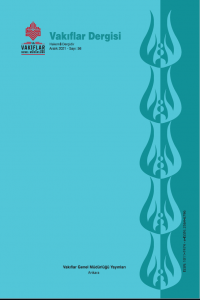The Role of Pious Endowments in the Spreading th Mawlid Culture in the Northern Macedonia during the Ottoman Period
Abstract
Vesîletü'n-Necât (Path to Salvation) written by Süleyman Çelebi (d.825/1422), popularly known as Mawlid, was well received by the Ottoman society since the date it was written and was recited in various ceremonies. The Mawlid culture was transmitted from Anatolia to the Balkan geography in line with the conquest policies of the Ottoman Empire. The recitation of the Mawlid, which became a custom in a short time through pious endowments and philanthropists in Macedonian lands, was influential in many areas of social life. As a matter of fact, the recitations organized by pious endowments on the Prophet's birthday and blessed days and nights, had become a tradition in opening ceremonies, circumcision ceremonies, weddings, funerals and similar occasions in time. In the light of the data from the pious endowments, detailed information is available on issues such as when the Mawlid was recited, what was served to those attending the ceremony, and how much the Mawlidhan was paid for their duties. In this study, information on 24 pious endowments established for Mawlid services in Macedonia will be provided.
References
- VGMA, Defter 581, Sayfa 381, Sıra 282. VGMA, Defter 604, Sayfa 59, Sıra 82. VGMA, Defter 629, Sayfa 415, Sıra 332. VGMA, Defter 744, Sayfa 155, Sıra 39. VGMA, Defter 987, Sayfa 61, Sıra 96.
Abstract
Keywords
References
- VGMA, Defter 581, Sayfa 381, Sıra 282. VGMA, Defter 604, Sayfa 59, Sıra 82. VGMA, Defter 629, Sayfa 415, Sıra 332. VGMA, Defter 744, Sayfa 155, Sıra 39. VGMA, Defter 987, Sayfa 61, Sıra 96.
Details
| Primary Language | Turkish |
|---|---|
| Journal Section | Articles |
| Authors | |
| Publication Date | December 29, 2021 |
| Submission Date | March 12, 2021 |
| Acceptance Date | May 31, 2021 |
| Published in Issue | Year 2021 Issue: 56 |
Cited By
Kentlileşme Ve Dini-Kültürel Değişme Bağlamında Bazı Dini Pratikler
Kocatepe İslami İlimler Dergisi
https://doi.org/10.52637/kiid.1161040
The articles sent to the Journal of Waqfs with a request for publication are subject to preliminary examination by the Editorial Board and at least two academicians who are experts in their fields are sent for review. The copyright of the articles accepted to be published in the Journal of Waqfs with the referee reports and the decision of the Editorial Board is deemed to have been transferred to the General Directorate of Foundations, and a royalty fee is paid to the published articles in accordance with the relevant legislation.


